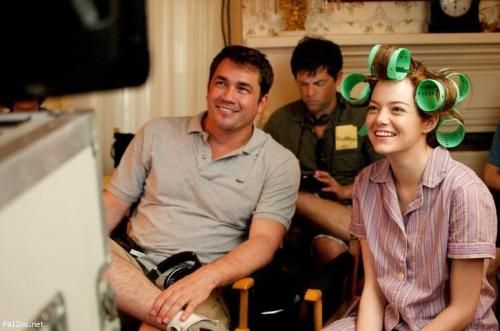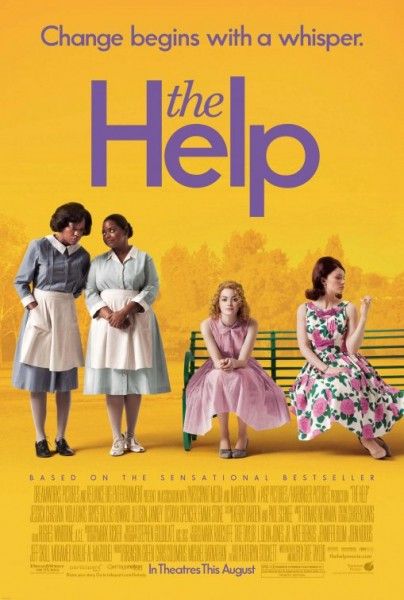When director/screenwriter Tate Taylor read his close friend Kathryn Stockett’s debut novel, The Help, he knew that he had to make it into a movie. He reached out to producer Brunson Green and actress Octavia Spencer, both of whom he had been good friends with for years, and they immediately wanted to get involved with the project. After studio rejections and much struggle to get it made, the finished product tells a moving and poignant story that is both heartbreaking and heartwarming, with performances from its cast that are so strong they deserve to be remembered come awards season.
At the film’s press day, producer Brunson Green did this exclusive interview with Collider, in which he talked about how friendship got this film made, how being from the South drew him to this story, that they saw 400 women for the roles in the film but just knew when the right one came in for each role, and how this story really gets you in both the heart and the gut. He also said that, now that this film is done, he’s combing through material, including the true story of the most famous interracial couple in the 1950's and a romantic comedy with Octavia Spencer, and he hopes to make another film soon. Check out what he had to say after the jump:
Question: When you initially met Tate Taylor, did you talk about making films together, at some point, or did that idea develop along the way?
BRUNSON GREEN: Well, we met in Mississippi through a mutual friend, and the only reason she introduced us was because he was interested in working in film and our mutual friend was like, “Brunson is coming into town and he works in film.” So, she asked us to go to this blues festival together, and that’s when we first met. We had a lot of mutual friends, but we went to different high schools, so we didn’t know each other as kids. Our parents knew each other, but it was rival high schools. So, our first conversation was about film. I suggested that he go work on this movie called A Time to Kill, which was shooting in Jackson, and he worked on that and met Octavia [Spencer] on that movie. It’s weird that that one friend of ours in Mississippi, who put us together, is the whole reason Tate met Octavia, and then they all moved to L.A. We’re here because of friendship. It’s cool.
Was it always producing that you wanted to do, so that you could be involved in the development of stories?
GREEN: When I graduated from college in Texas, I didn’t know exactly what I wanted to do. I had taken a break from school and worked at a bank. I always liked film and thought I wanted to work in it, but I didn’t know in what capacity. And then, there was a recession when I got out of college, so I was able to take an internship. I had a free place to live in Austin, through a fraternity brother, so I was like, “I’m not going to get a paying job, but I’m going to go work on this movie and see how it is.” I loved it. I was a props intern on a Western. It was the producer of Lonesome Dove, and he wrote the screenplay. It was a TV pilot for CBS. I worked freelance for years, in every department besides hair and make-up, and realized that I knew how a production works. I was working as an A.D. and they said, “My friend is coming to Austin. They want to shoot an indie movie. You might be a good producer for them.” It was just somebody suggesting, “I think you might be good at this.” It just happened. Once again, it was a friend suggesting it.
So, how did you finally end up working with Tate?
GREEN: Tate and I were really good friends, and he wrote this short called Chicken Party. He was an actor, but he was getting interested in writing from The Groundlings, so he said, “I want to do this short, but I need some help,” and I was like, “Oh, I’ll help you.” Then, I ended up producing it and it ended up being a two and a half year process. We did 35 festivals and we won 12 of them. What seems to be just a small, short period of time ends up taking over your life. So, we’ve done several projects together. When he read The Help, he called me and said, “You’ve got to read this. I want to make this into a movie.” It’s been a fun ride.
What was it about The Help that really struck you, when you read it?
GREEN: When I first read it, I finished it on an airplane, bawling and smiling. I had a sense of pride that Kathryn [Stockett], this dear friend of mine, had written this amazing novel. And then, Octavia read it and went nuts over it, so it was like, “Okay, this is something that people really relate to and they get something out of it.” It’s a completely different genre than what Tate had done in the past, but I knew he could handle it because he grew up there. We all grew up there. It resonated with me because I’m from the South, but the material also really gets to your heart and your gut. It’s great.
What’s it like to know that the novel struggled to find a publisher, and now it has such a dream cast of actors and it’s this big movie that so many people want to see? Do you have moments where you wonder how it actually all came together?
GREEN: Yeah. We knew things were going to work out, and though it was really hard to bring it to the screen because we also had a lot of rejections on the studio side and people were saying what’s hard about making that type of book into a movie, it didn’t mean that it shouldn’t be made into a movie. We knew it was going to really translate well and people were going to love it once it was done. Knowing it was going to be made and that we were going to make it no matter what – whether we had to make it for $3 million or make it on a studio level – there was no turning back. When things kept working out, and then (producer) Chris [Columbus] and 1492 got involved and got excited, it was no question that eventually everything was going to work out. I think a lot of it is that, when you have friends that want to help you out as much as possible, and they want something to be a success, and they pass the word and call in favors, and there’s so much good will behind a project, there’s nothing to stop you. Now, it’s at the point where we just hope people come to see it. Hopefully, a ton of people will get to see it. When you do an independent film, you sweat blood to try to get it finished and get people to see it, and usually not that many people see it. It’s just as hard to make that type of film, as it is a big studio film.
How did you approach the casting process for this film? Was there a character or characters that you knew were the key that you just had to find the right people for first, or were you casting all the roles at the same time?
GREEN: That’s a good question. Well, we cast everything at the same time. We didn’t necessarily say, “We have to find our Skeeter first,” or “We have to find our Aibileen first.” We knew that Octavia and Allison [Janney] were definitely going to be in the movie, no matter what, ‘cause Tate had crafted those roles for them. We just started seeing women for all different roles, and sometimes they’d come in for one role and then come back for another. There was a lot of shifting. There was maybe one instance where it was between two people and we didn’t know exactly who was going to play the role. Even though we saw 400 women, when that person came in that was right, you just knew it. You just felt it.
Now that you’ve spent so much time developing this project and bringing it to the big screen, do you know what you’re going to be focusing on next?
GREEN: There’s a lot of material that I’ve been combing through, and I’ve found some really good, interesting projects. One is based on the true story of Seretse Khama and Ruth Williams. They were the most famous interracial couple in the 1950's, in the world. Their interracial love against apartheid created Botswana, which is a real success story of Africa. I’m also developing a romantic comedy with Octavia [Spencer]. It runs the gamut. There’s some great stuff that I’ve found, and hopefully I’ll get to make another one soon.


